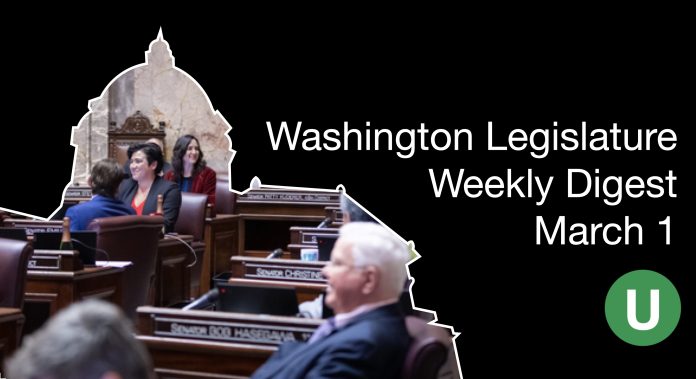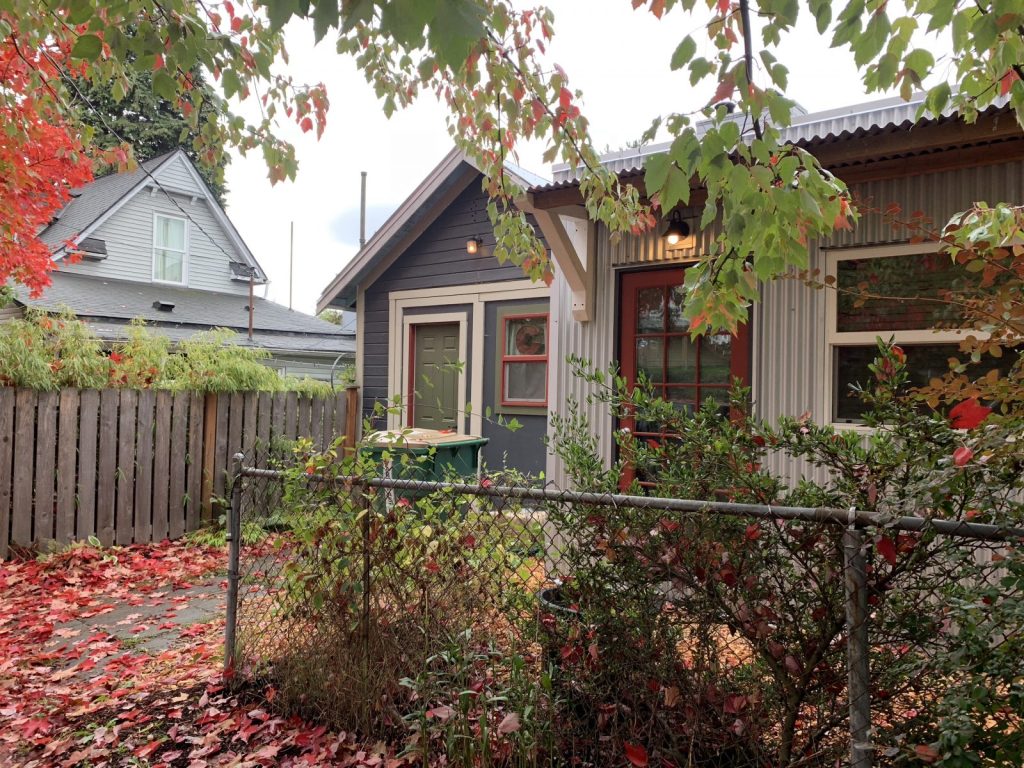
WALeg Wednesday Prepares for Floor Vote Frenzies and Small Improvements to Regulations.
Another week in the Washington Legislature and another legislative calendar cutoff has passed. Bills that did not get out of their respective chamber’s budget committee (Appropriations in the House and Ways & Means in the Senate) are dead for the year. The process cut short the life of HB 1045 – The Evergreen Basic Income Pilot program and Seattle Rep. Nicole Macri’s rent stabilization bill, HB 1388. Bellingham Rep. Alex Ramel’s rent stabilization bill, HB 1389, is still alive, however.
A number of companion bills have also vaporized, but that is more procedural as the primary bills now prepare to move to the opposite chamber with all their amendments in tow. The next two weeks will be a flurry of floor votes.
The good news is that big bills about transit-oriented development (TOD), missing middle housing, and climate change are still moving forward, as well as a number of other great concepts and tenants rights legislation. Next step for many of these bills will be receiving a place to be heard for a second reading on the chamber floor. For those that already have a spot on the House or the Senate’s floor agenda, their item number is noted. This would be the time to contact legislators in support, using the “Comment on this bill” feature on the bill’s page.
Two other housing bills have appeared on the horizon. HB 1245 concerns lot splitting and shows up in conversations by some jurisdictions about the Missing Middle bill. HB 1337 is a statewide accessory dwelling unit (ADU) bill. We discuss both of them in depth below.
Important Bills At A Glance.
- HB 1110 – Missing Middle is still in the House
- Next Move – Placed on the floor calendar. Item #42.
- More Coverage – Read about the most recent amendments it took to get out of committee and PSRC’s analysis of the number of potential homes the bill would create.
- Notes – Companion bill SB 5190 did not escape Senate Ways & Means, so HB 1110 is the focus.
- HB 1181 – GMA Climate Change provisions
- Next Move – Waiting for scheduling to get on the floor calendar.
- More Coverage – Please see December’s Meetup with Futurewise and Futurewise’s campaign page.
- Notes – Companion Bill SB 5203 did not escape Senate Ways & Means, so HB 1181 is the focus.
- SB 5466 – Promoting Transit Oriented Development
- Next Move – Placed on the floor calendar. Item #76.
- More Coverage – The Urbanist did a big breakdown of the bill from January and also has done a little coverage of transit-oriented development (TOD) in the past. Sightline Institute also has some good info on this TOD bill.
- Notes – Companion Bill HB 1517 did not escape Housing Committee, so SB 5466 is the focus. Here’s the latest bill report.
Other Important Bills
- HB 1026 – Local Government Design Review Reform
- Next Move – Placed on the floor calendar. Item #1.
- More Coverage – The Urbanist’s coverage of Seattle’s need to overhaul design review and the first tacit steps.
- HB 1131 – WRAP Act (bottle deposit and packaging reform)
- Next Move – Waiting for scheduling to get on the floor calendar.
- More Coverage – Check out Ashli Blow’s article introducing us to the Washington Recycling and Packaging Act (WRAP Act) and the need for it now.
- Notes – Companion Bill SB 5154 did not escape Ways & Means.
- HB 1245 – Lot Splitting
- Next Move – Waiting for scheduling to get on the floor calendar.
- More Coverage – See below.
- Notes – Companion Bill SB 5364 is waiting on scheduling in the Senate.
- HB 1337 – Easing Barriers for ADUs
- Next Move – Placed on the floor calendar. Item #7.
- More Coverage – See below.
- SB 5383 – Concerning Pedestrians Crossing and Moving Along Roadways
- Next Move – Waiting for scheduling to get on the floor calendar.
- More Coverage – See WALeg Week 2 – Weekly Focus with the troubling origins of “jaywalking” and the ways removing these laws makes the streets safer.
- Notes – Companion Bill HB 1428 did not escape Transportation Committee
Tenants Rights Bills
- HB 1124 – Protecting Tenants from Excessive Rent and Related Fees
- Next Move – Waiting for scheduling to get on the floor calendar.
- More Coverage – See WALeg Week 3 – Weekly Focus with the difference between rent stabilization bills like these and the misnomer “rent control” that gets dropped pejoratively against any sort of benefit for renters.
- HB 1389 – Residential Rent Increases Under the Landlord Tenant Act
- Next Move – Waiting for scheduling to get on the floor calendar.
- More Coverage – See WALeg Week 3 – Weekly Focus with the difference between rent stabilization bills like these and the misnomer “rent control” that gets dropped pejoratively against any sort of benefit for renters.
- Notes – Companion Bill SB 5435 did not escape Housing Committee.

Weekly Focus: Lot Splitting and Statewide ADUs.
With the focus at the top of the legislative housing fight card on big legislation about missing middle and TOD, it has been possible to overlook a number of other housing bills. Since the legislative cutoffs have winnowed the field, we can now turn attention to two sets of legislation that look like they’re moving forward.
The first, HB 1245 and its companion SB 5364, concern changing the rules about dividing residential lots. Sponsored by Senator Andrew Barkis (R – LD2 Yelm) in the House and Noel Frame (D – LD 43 Ballard) in the Senate, the bill requires jurisdictions to allow single family detached lots over 3,000 square feet to be split, creating two new buildable lots. Cities are not permitted to make certain parking, width, or design regulations on the new lots. Barkis is a co-sponsor of the Missing Middle legislation and spoke with The Urbanist about why he is pushing for bipartisan housing reform.
Subdivision is not the sexiest of all land use controls, but it does result in some of the most profound impacts on the shape of our cities. On one side, shredding the city into tiny lots reinforces land ownership as the only path to stable housing instead of promoting alternative ownership models like co-ops and condos. On the other, subdividing land without the ability to split lots works in concert with zoning, covenants, and mortgages to produce sprawl.
In this case, the balance may sway towards giving mortgage-burdened homeowners more options to control their property. Dan Bertolet points out over at Sightline that lot splitting in California has produced modest change, but ones that can be focused on keeping multigenerational families in place in gentrifying communities. As he puts it, lot splitting is a piece of the housing mix to “open the doors for a diverse mix of Washingtonians in all types of communities to find the right home for them.”
The deeper controversy here is for jurisdictions that use lot size as an exclusionary mechanism to maintain a baseline house price. Ryan Packer listened in on the discussion about the bill at Medina’s city council. Among those testifying against the bill in Olympia were predictably the City of Mercer Island and the Association of Washington Cities.
Parallel to lot splitting is the statewide accessory dwelling unit bill, HB 1337 sponsored by SeaTac Rep. Mia Gregerson (D – LD33). The legislation prompts cities to permit ADUs of up to 2 stories and 1,000 square feet on any legal residential lot by July 2024. There are also requirements on dropping parking requirements, impact fees, residency requirements, or multiple ADU provisions of which the cities need to pick two. This is a perennial bill from Gregerson, but in the “year of housing” it may fare better. While supporters included homebuilders, Habitat for Humanity, the American Farmland Trust, and the League of Women Voters, both the Washington State Association of Counties and the Association of Washington Cities spoke in opposition to the bill.
It is interesting to consider the lot splitting and ADU bills to be two sides of the same coin. For those who want to shed a portion of their property to construct housing, the lot splitting bill permits it. For those who want to keep a single lot with an extra dwelling or two, whether for family or rental, the ADU bill is the way to go. Together, they emphasize there is thinking that our residential lots are just too big. Studies suggest house lot sizes are shrinking (while the houses are getting larger) so these tools reflect options for folks stuck on oversized lots.
In total, the two bills do not get the same flashy headlines as legislation that overrules generational apartment bans or guarantees cranes at light rail stations. But they do cut into the institutional barriers that sandbag against lasting change. It is these little rules that represent the day-to-day barriers and expenses keeping an average property owner locked out of adding a cottage on their lot. Efforts to change the small things may be bigger evidence of a profound systemic shift in housing.
Ray Dubicki is a stay-at-home dad and parent-on-call for taking care of general school and neighborhood tasks around Ballard. This lets him see how urbanism works (or doesn’t) during the hours most people are locked in their office. He is an attorney and urbanist by training, with soup-to-nuts planning experience from code enforcement to university development to writing zoning ordinances. He enjoys using PowerPoint, but only because it’s no longer a weekly obligation.


